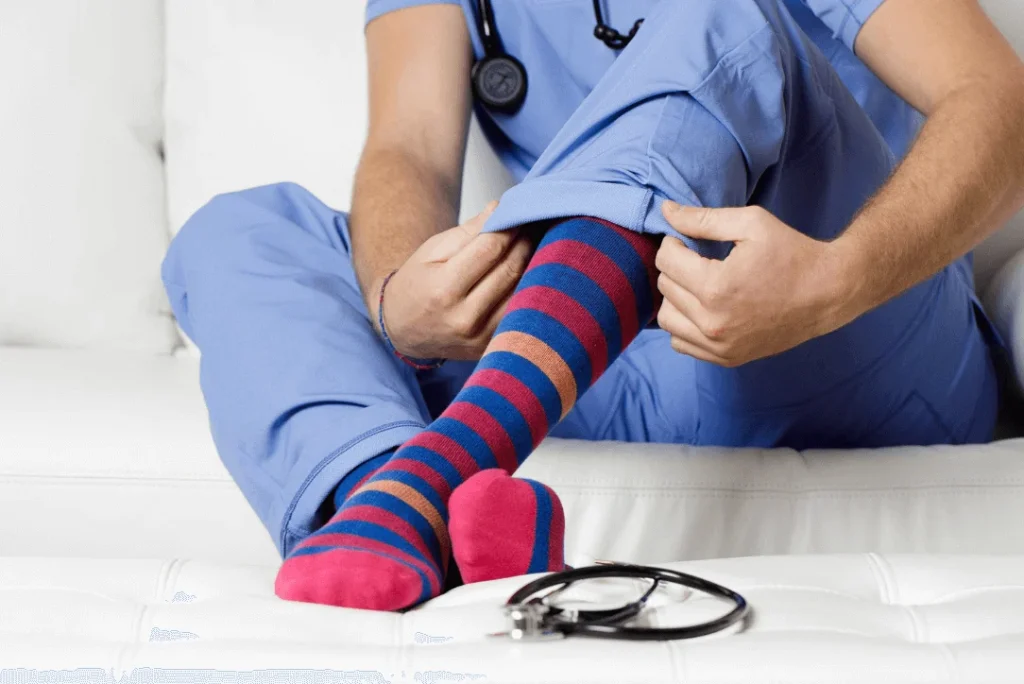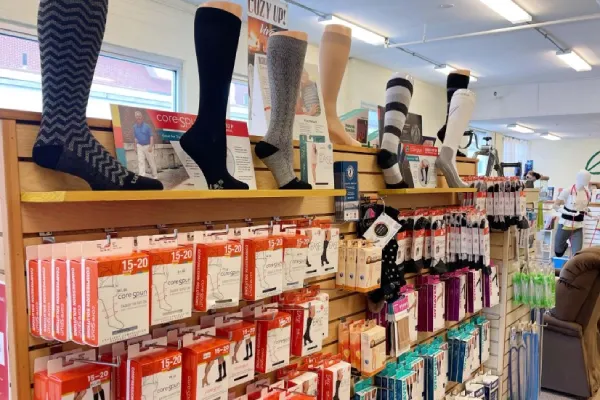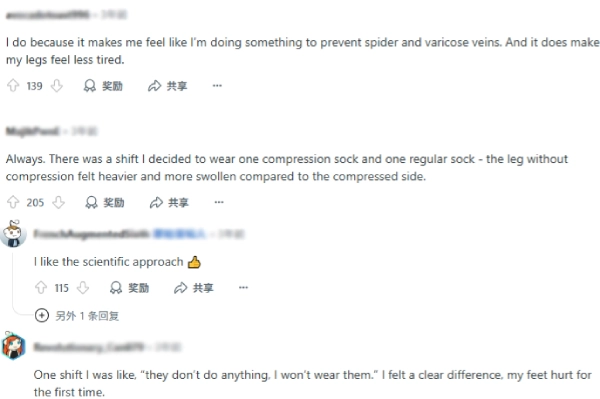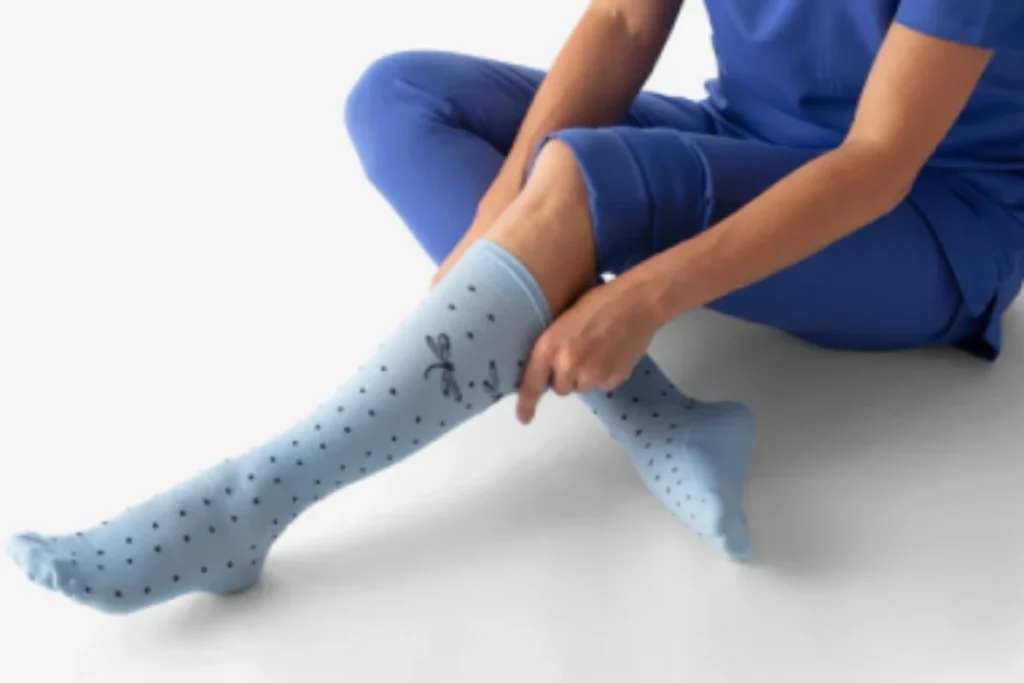Nurses spend most of their shifts on their feet—walking, standing, and moving constantly. A typical shift runs 8 to 12 hours, sometimes even longer. They rarely sit. Instead, they move between rooms, assist patients, adjust equipment, and support doctors. This constant motion adds stress to their legs.
By the end of the day, it’s common to feel fatigue, swelling, or even pain in the calves or behind the knees. That’s why many nurses choose to wear compression socks.
What Problems Do Compression Socks Solve?

Nurses who stand for hours often suffer from leg swelling, heaviness, and early varicose veins. Compression socks for nurses help ease these problems by improving circulation and reducing discomfort during long shifts.
How Compression Socks Help Nurses Feel Better

Nurses move all day — but their blood doesn’t always keep up. Long hours of standing or limited movement can slow circulation, causing blood to pool around the ankles. That leads to swelling, heaviness, and discomfort. Compression socks use graduated pressure — tighter at the ankle, lighter up the calf — to support blood flow. This helps:
- Push blood back toward the heart
- Reduce swelling from prolonged standing
- Relieve leg fatigue and heaviness
- Lower the risk of cramps or discomfort
Many nurses report that wearing compression socks helps them:
- Stay comfortable during long shifts
- Recover faster afterward
- Sleep more soundly after being on their feet all day
Which Types Are Best for Nurses?

Nurses need daily comfort and support. That’s why most choose 15–20 mmHg compression socks in knee-high length—strong enough to improve circulation, gentle enough for long shifts.
Popular features include:
- Cotton or nylon blends for softness and durability
- Moisture-wicking yarns to keep feet dry
- Wide cuffs that stay in place without digging in
Designs range from white or black for uniforms to fun medical-themed patterns for online retail. Offering multiple sizes, including wide-calf options, ensures a better fit and satisfaction.
For B2B buyers, align your stock with your audience—uniform distributors, scrub brands, or e-commerce sellers all have different needs.
| Feature | Why It Matters for Nurses |
|---|---|
| 15–20 mmHg compression | Safe for daily use, helps circulation |
| Knee-high length | Covers areas where swelling happens |
| Moisture-wicking fabric | Keeps feet dry during long shifts |
| Stretch-fit design | Comfort for long wear, easy to pull on |
| Durable and washable | Saves time, lasts through many washes |
Is Wearing Compression Socks for Nurses Recommended or Required?

In most hospitals, compression socks are not required — but they are widely recommended.
Some clinics even include them in new nurse welcome kits. Others mention them during orientation. Many senior nurses tell new hires, “Get yourself a few pairs — your legs will thank you.”
Nursing schools also address this during training. Especially when discussing occupational health risks like:
- Varicose veins
- Chronic swelling
- Circulation problems
Hospitals know the benefits. Some departments, like surgery or emergency, have nurses standing for 10–12 hours straight. These nurses are more likely to wear compression gear daily. More hospitals are quietly supporting them:
- Staff discounts for approved brands
- Reimbursement for wellness-related purchases
- Guidelines for safe compression wear
The result? Compression socks have become part of the unofficial uniform for many nurses. Especially those who’ve been working for years — they’ve seen the difference.
What Brands and Distributors Should Know

There’s growing demand for compression socks made specifically for nurses. Because generic compression socks don’t always work. Nurses want:
- A balance of pressure and comfort
- Fit that works with scrubs and work shoes
- Fabrics that breathe, stretch, and last
If you’re a B2B buyer — maybe you sell workwear, scrubs, nurse shoes, or medical accessories — compression socks are a natural product extension. And if you’re a brand, here’s what else matters:
- Sizing range: Include regular and wide-calf sizes
- Custom colors: Match scrubs or hospital branding
- Private label: Offer logo or packaging customization
- Retail-ready: Clear product descriptions and easy-to-understand compression levels
You’re not just selling a sock. You’re selling daily comfort, productivity, and long-term leg health — things nurses care about deeply.
Conclusion
Nurses work hard. And the right gear can make their day easier. Compression socks aren’t a trend — they’re a daily need for thousands of healthcare workers. If you’re a uniform supplier, online store, or medical workwear brand, compression socks should be included in your catalog.
We’re a factory that helps brands design and produce custom compression socks — based on real user needs. Materials, sizes, styles — all customizable. If you’re looking to create your line for healthcare workers, we’re here to help.
Let’s talk about how to make compression socks that nurses will truly want to wear.
FAQs
Where can I find nursing accessories wholesale suppliers?
If you’re sourcing in bulk for clinics, nursing schools, or retail platforms, many wholesale suppliers specialize in nursing accessories wholesale, including compression socks, stethoscope holders, and badge reels.
Can I customize compression socks with nurse-specific designs?
Yes. Many factories now offer custom nurse socks that feature patterns such as heartbeat lines, medical symbols, or scrub-friendly color palettes. These options are popular among hospital gift shops and uniform retailers.
How do I find a reliable compression socks supplier for healthcare use?
Start with suppliers that specialize in medical-grade hosiery. A trustworthy compression socks supplier should provide certifications, compression testing reports, and fabric durability data suited for long nursing shifts.
Do compression socks coordinate with nursing footwear brands?
Most nursing footwear brands prioritize all-day comfort and foot support. Pairing them with properly fitted compression socks reduces leg fatigue and keeps uniform aesthetics consistent during long shifts.
Where do healthcare uniform retailers typically source their socks?
Uniform retailers for healthcare often partner directly with sock factories or sourcing agents who can offer branded packaging, customized sizing, and direct factory pricing—especially for high-volume needs like hospital systems or education programs.
